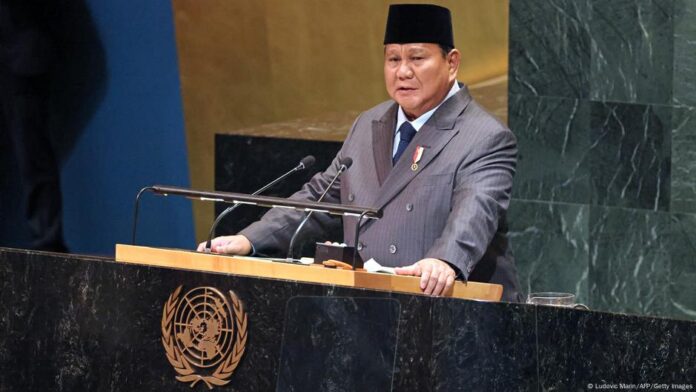Former general Prabowo Subianto was inaugurated as Indonesia’s eighth president on October 20, 2024, after winning the February election by a landslide and marking a major shift in leadership for the world’s fourth most populous nation.
In his first year, Subianto made the second-highest number of diplomatic visits in Indonesian presidential history.
After returning from the Gaza peace summit in Sharm el-Sheikh earlier this month, he said Indonesia was willing to offer at least 20,000 troops to help secure peace in Gaza.
“We’ve sent aid, we’ve dispatched ships, and we’ve flown Hercules aircraft multiple times,” President Subianto said. “We’ve also delivered substantial food assistance, thousands of tons of rice. And we remain firmly committed to this action.”
When US President Donald Trump proposed a 20-point plan to end the war in Gaza during Israeli Prime Minister Benjamin Netanyahu’s visit to the White House in September, Indonesia — along with several other Muslim-majority nations — issued a statement backing Trump’s plan.
Calls for peace in the Middle East
Indonesia, the world’s most populous Muslim-majority nation, has no diplomatic ties with Israel and is a staunch supporter of Palestinian statehood.
In his speech to the UN General Assembly on September 23, which strongly condemned Israel for its continued attacks on the Gaza Strip, Subianto said, “we must also recognize and guarantee the safety and security of Israel,” while calling for an independent Palestinian state.
“Only then can we have real peace,” he said, “peace without hate, peace without suspicion.”
Trump praised Subianto on several occasions, describing him during the Sharm el-Sheikh summit as “an extraordinary figure from Indonesia,” adding that Indonesia is a “big, powerful country, whose endeavor is extraordinary.” Subianto said Trump’s peace plan was “a promising step toward achieving peace.”
Strengthening Indonesia’s ties with Europe
When he took office, Subianto said he would lift Indonesia’s economic growth rate to 8%, up from 5.05%.
To this end, Subianto was able to wrap up theIndonesia–EU Comprehensive Economic Partnership Agreement (IEU-CEPA) after more than nine years of negotiations.
The IEU-CEPA is seen as a major milestone in opening new markets and boosting foreign investment in Indonesia.
The deal will scrap most tariffs on EU exports including car parts, agriculture and pharmaceuticals, while opening investment in sectors such as electric vehicles.
Dewa Gede Sidan Raeskyesa, a foreign direct investment (FDI) researcher at the Vienna University of Economics and Business, described the deal as a positive signal.
However, Sidan cautioned that agreements like the IEU-CEPA do not automatically guarantee improved welfare for the Indonesian population.
“Relying solely on exports and imports isn’t enough,” he noted. “What we truly need is foreign direct investment that is genuinely productive.”
Sidan said it is important that the investment does not leave the local workforce behind.
“If our workforce lacks the necessary skills, or if regulations fail to include local small and medium enterprises, investment could widen inequality,” he said. “It’s a double-edged sword.”
According to Sidan, economic diplomacy has created many opportunities for Indonesia.
However, without policies that ensure equitable distribution of its benefits, he warned, it risks deepening the divide between central and regional areas, and between large industries and small-scale workers.
Subianto’s diplomatic ‘FOMO’
Subianto has made more diplomatic visits in his first year than any previous Indonesian president.
Radityo Dharmaputra, a foreign policy analyst at Indonesia’s Airlangga University, described Subianto’s approach as “FOMO diplomacy,” referring to a style of engagement driven by fear of missing out on major global gatherings, rather than a measured long-term strategy.
“It’s been too personal so far,” Radityo said, adding that everything depends on the president’s preferences.
“The Ministry of Foreign Affairs, which should be leading the charge, often ends up having to clarify presidential statements to avoid misinterpretation on the international stage,” Radityo added.
Radityo recalled Subianto’s speech at the United Nations General Assembly, during which he announced new national targets under the Paris Agreement and called for global action on climate change.
However, he noted that the ministries had yet to prepare concrete follow-up measures.
“At the time, European diplomats asked whether Indonesia was truly committed. I was there, and the relevant ministries couldn’t yet explain the implications. That’s where our diplomatic gap lies,” he said.
Indonesian Deputy Foreign Minister Arief Havas Oegroseno rejected criticism from experts who argue that Subianto’s diplomatic approach is overly personal and lacks coordination with the Ministry of Foreign Affairs.
“There’s no such thing as a lack of coordination,” he told DW.
“Every presidential speech is prepared by a team of speechwriters along with the Foreign Ministry. That’s standard practice,” he added.
Havas believes that during the first year of his presidency, Subianto’s administration has aligned with the principles of Indonesia’s foreign policy: sovereignty, active engagement, and public benefit.
“In fact, it affirms Indonesia’s legitimacy as the largest Muslim-majority democratic country in the world,” Havas said.
“We must be present, because in diplomacy, being present is already a half-win.”
This article has been adapted from Bahasa Indonesia
Source link






